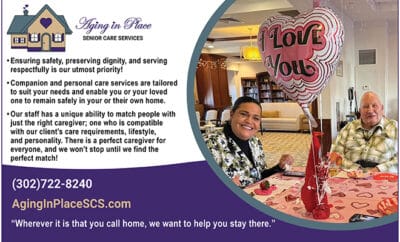Living Life with Alzheimer’s
 By Kristin Stetler Donovan, Owner, Age Advantage of Newark
By Kristin Stetler Donovan, Owner, Age Advantage of Newark
Many of us have no idea what Alzheimer’s or Dementia is, until someone we love is diagnosed—or we personally are diagnosed—with this life-changing disease and witness the dramatic changes that come with it. Alzheimer’s/Dementia not only affects the person diagnosed but those nearest and dearest to them. It is painful to watch a parent, spouse, or loved one seemingly disappear in front of our eyes.
While cognitive decline is a common condition associated with aging, an Alzheimer’s/Dementia diagnosis can have even more devastating effects. The many unanswered questions associated with this horrible disease can be frustrating and scary, especially since no one really knows what causes it and, to date, there is no cure. That makes it even more important to understand what we can do about the symptoms and effects on us and our loved ones.
Here’s what we know: Alzheimer’s is the most common of the dementias. The term dementia describes symptoms of a disease that damages brain cells. Dementia isn’t always Alzheimer’s but Alzheimer’s always includes dementia. According to the Alzheimer’s Association Facts and Figures Report, Alzheimer’s accounts for 60 to 80 percent of dementia cases. This report also reveals the startling statistic that nearly half of Americans age 85 and older suffer from Alzheimer’s disease and over 13 percent suffer at age 65. In 2013, The Center for Disease Control and Prevention found that as many as 5 million Americans suffer from the disease. The disturbing prevalence of this disease means it is likely that you either know or care for someone with, or have been diagnosed with, this disease.
Alzheimer’s is a progressive disease that begins in the learning part of the brain. Memory loss is often the first initial sign. It is important to diagnose this disease in its early stages as there are medications that may slow the process. Each individual experiences the disease—and its progression—differently; therefore, the rules of care change constantly. As the disease progresses, living with it and caring for those who have it gets harder. Time can bring unbelievable challenges as well as surprising moments of pure joy. One of the keys to living with Alzheimer’s is about living in the moment.
As time goes on, the disease will progress and its symptoms will become increasingly severe. The Alzheimer’s Association tells us that symptoms may include “disorientation; mood and behavior changes; deepening confusion about events, time and place; unfounded suspicions about family, friends and professional caregivers; serious memory loss and behavior changes; and difficulty speaking, swallowing and walking.”
In addition, the Alzheimer’s Association reports that families of Alzheimer’s patients provide an astounding 80% of the care in the home. In light of that, the right care approach can help your loved one maintain a high quality of life even in the face of increasing memory loss. Caregivers for a person diagnosed with Alzheimer’s must deal with difficult moments but must not allow these moments to define the day. There is a constant motion, growth, and change and it’s important to adapt to and accept the changes as they occur, as difficult as they may be. Success may be found in the type or tone of communication, the time of day, or the color or design of the caregiver’s shirt. What used to work may not always work, and what didn’t work previously, may now work. Creativity, balanced with consistency, is required to face the ebb and flow of progress as each day brings a new challenge.
Experience (and common sense) tells us that staying in the familiar surroundings of home can help seniors with memory loss maintain their feelings of being safe and loved. Another thing to consider is that seniors suffering from Alzheimer’s and dementia can benefit from being at home in a number of ways, including reduced fear and anxiety; higher frequency of visits from family, friends and neighbors; and even the comfort of meals coming from their own kitchen. If possible, we encourage caring at home, but recommend that families not try to bear the burden of Alzheimer’s alone.
While care for the person with Alzheimer’s is paramount, care must also extend to the caregiver. Serving a loved one with Alzheimer’s is often exhausting and all-consuming for the primary caregiver and the family. It is important to share the responsibilities, to take advantage of support services available through the state, nonprofits, churches, Veterans Aid, etc., and to seek frequent emotional support, which provides benefits for all involved. Despite all of this, you may find that you still need additional help. If so, we welcome you to call to discuss options and resources. Any of the Age Advantage staff would be happy to assist you. Please call (302)722-8240 if you would like additional guidance or information.
Testimonial
“I wanted to reach out to thank you for everything you and your staff did for my father. Including you, Charlie, Nenah (the caregiver) and your staff, my father was always treated with respect and everything was handled so professionally. As you can imagine these were some of the toughest times we’ve had to deal with, and knowing that we could rely on a good company, with good workers, with an owner who genuinely cared, gave us such peace of mind. Finally we will definitely refer you to anyone who might be in need of your services in the future.” – Marty





